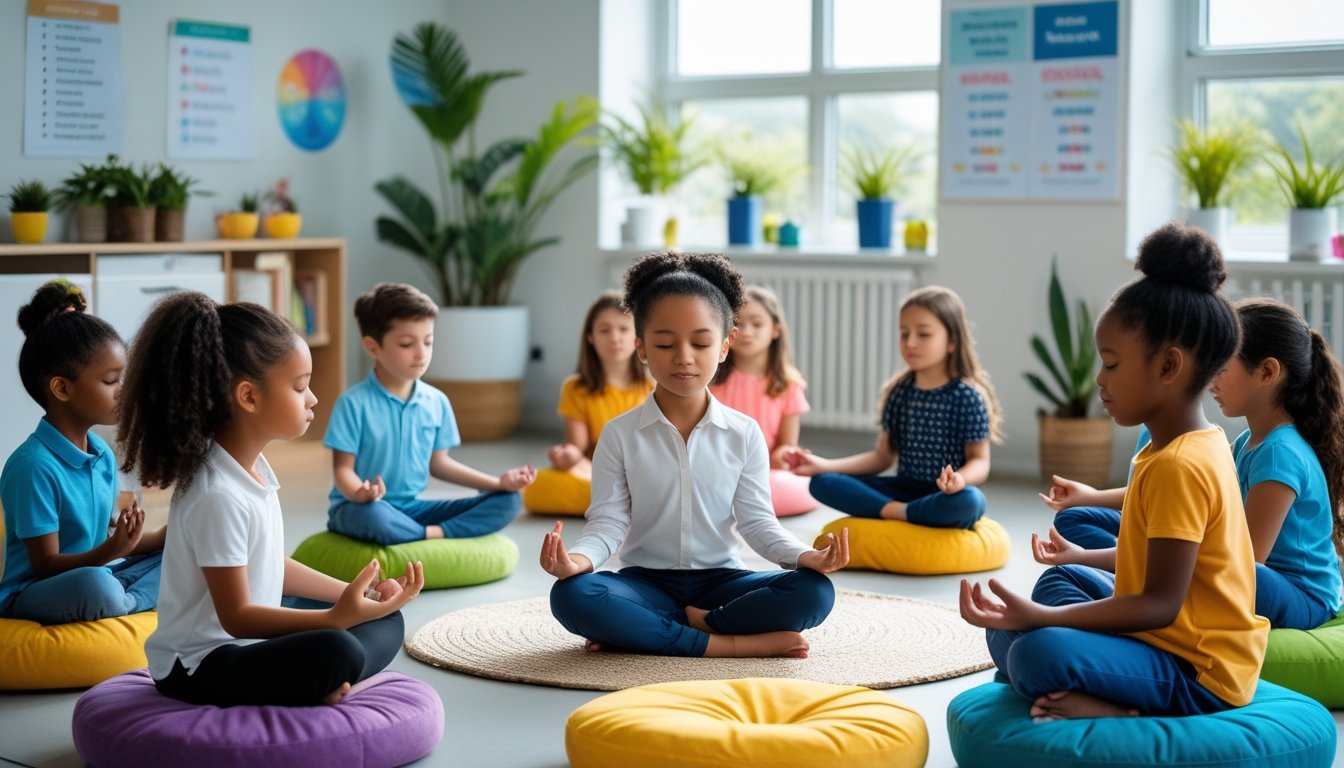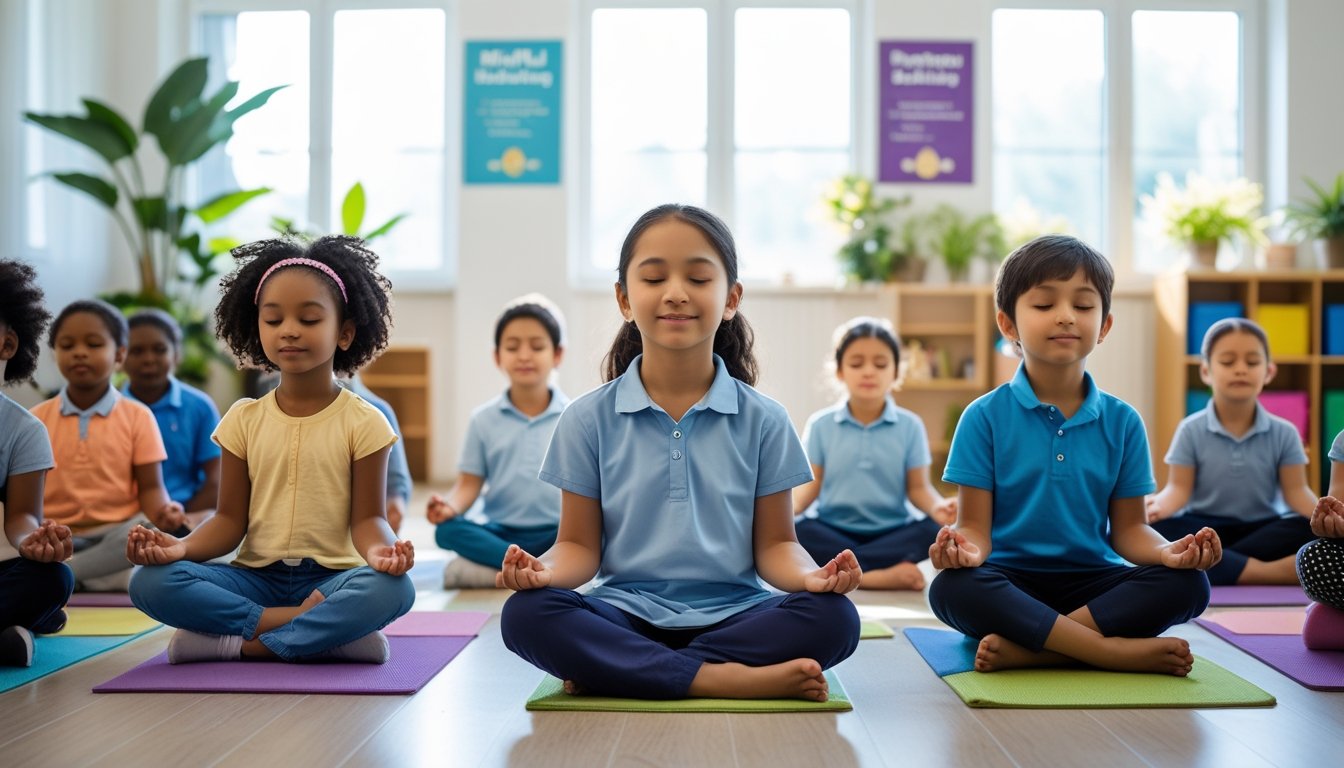Late updated: 23 Sep 2025 11:09
Written by:
Exploring Benefits Of Mindful Education For Children: Enhancing Focus And Wellbeing
Introducing mindfulness in education transforms classrooms into nurturing environments where children can thrive emotionally and academically. Teaching mindfulness equips our children with the ability to better handle stress, improve focus, and manage their emotions. As these skills are acquired, children grow into well-rounded individuals who can navigate life's challenges with poise and confidence.

In our increasingly fast-paced world, providing children with tools to cultivate self-awareness and emotional intelligence becomes paramount. Mindfulness practices in schools are pivotal not only for emotional regulation but also for enhancing cognitive abilities. By focusing on being present, students can improve their learning outcomes and develop resilience that extends beyond school hours.
Embedding mindful practices in educational settings is a practical approach to fostering better mental health and academic success. Through activities such as mindful breathing and meditation, children can become more self-aware and develop better decision-making skills. These benefits underscore the importance of integrating mindfulness into our educational systems.
Key Takeaways
- Mindful education improves children's focus and stress management.
- Mindfulness in schools boosts emotional intelligence and cognitive skills.
- Implementing mindfulness fosters resilience and self-confidence.
Core Benefits of Mindful Education for Children

Mindful education for children provides a myriad of benefits, including enhanced emotional intelligence, improved mental health, and strengthened social skills. These practices support the development of self-regulation, resilience, and better focus, contributing to a child's ability to navigate challenges successfully.
Enhancing Emotional Regulation and Self-Awareness
Mindful education helps children develop a greater sense of emotional regulation. By fostering an environment of awareness and self-reflection, children learn to recognise and manage their emotions effectively. This process encourages self-awareness, allowing them to observe their feelings without judgement.
As we guide children through these exercises, they begin to understand the source of their emotions and learn strategies to cope with them. This skill is crucial for managing stress and improves their interactions with others.
Supporting Resilience and Mental Health
Mindful education plays a pivotal role in building resilience. It equips children with tools to face adversities with a positive mindset, strengthening their mental health. The practice instils a sense of calm, empowering children to handle stress better.
By regularly engaging in mindfulness activities, children become more adaptable to change and recover more quickly from setbacks. This resilience contributes to their overall mental well-being, promoting a balanced emotional state.
Improving Academic Achievement and Attention
The impact of mindfulness on academic performance is significant. It helps sharpen focus and improve attention, which in turn leads to better academic achievement. By training children to concentrate on the present moment, mindfulness cultivates enhanced focus.
In classrooms, this results in improved self-regulation skills, allowing students to maintain attention on tasks, thus boosting their learning capacity. As a result, children are better prepared to engage with educational challenges effectively and efficiently.
Fostering Positive Social Skills and Prosocial Behaviour
Mindful education fosters positive social skills by promoting empathy and understanding. Children learn to engage with peers prosocially, enhancing collaborative efforts and meaningful relationships. By practising mindfulness, they develop stronger social connections.
These practices encourage listening and empathy, essential for building a sense of community among children. This nurturing environment supports the development of supportive, inclusive behaviours, benefiting their interactions both inside and outside the classroom.
Implementing Mindfulness Practices in Educational Settings
Mindfulness in education focuses on equipping students with tools for awareness and focus. This approach includes various mindfulness techniques, fostering positive learning environments, and integrating teacher training and structured programmes.
Mindfulness Techniques and Practical Activities
In implementing mindfulness practices in schools, diverse techniques can be adopted, such as mindful breathing and mindful movement. These exercises help students become more aware of their thoughts and emotions. Activities like guided meditation and mindful walking are simple yet effective. They encourage present-moment awareness and promote calm and concentration. Mindful communication within the classroom encourages empathy and enhances interactions between students and teachers, creating an atmosphere conducive to the overall well-being of students.
Creating a Positive Learning Environment
A positive learning environment is crucial in the successful implementation of mindfulness practices. By incorporating mindfulness resources and mindfulness activities into the curriculum, schools can create spaces where students feel safe and supported. Elementary schools can benefit from this by reducing stress, encouraging focus, and building emotional resilience among students. The shift towards a more mindful classroom fosters acceptance and reduces behavioural issues, ultimately shaping a more harmonious learning atmosphere.
Role of Teacher Training and Mindfulness Programmes
Teacher training is essential in guiding mindfulness initiatives in educational settings. A well-designed mindfulness programme equips teachers with the skills to effectively integrate mindfulness techniques into the classroom. Mindfulness-Based Stress Reduction (MBSR) programmes can be employed to prepare educators, offering them strategies for stress management and self-care. As teachers become familiar with these practices, they are better positioned to support student engagement and inspire a more mindful school environment.
Frequently Asked Questions

Mindfulness education offers a range of benefits, including improved emotional intelligence, better classroom behaviour, and enhanced academic performance. Understanding how to effectively implement mindfulness programmes is essential for both educators and students.
What are the core components of mindfulness programmes in schools?
Mindfulness programmes typically involve practices that promote attention to the present moment. These may include meditation, breathing exercises, and mindful movement like yoga. Introducing mindful activities in classrooms helps students develop self-regulation, focus, and a nonjudgmental awareness of their thoughts and emotions.
How does mindfulness contribute to a child's emotional intelligence?
By engaging in mindfulness, children build self-awareness and empathy. This practice develops their ability to recognise and manage their emotions, which is a cornerstone of emotional intelligence. As they become more attuned to their own feelings and the feelings of others, their interpersonal skills naturally strengthen.
In what ways can mindfulness improve classroom behaviour and learning?
Mindfulness practices help reduce stress and enhance concentration, which are critical for effective learning. In classrooms where mindfulness is integrated, children often show improved behaviour, less aggression, and a greater ability to stay focused. Such environments support a positive learning atmosphere and encourage students to engage more fully in their academic activities.
What evidence is there to support the effectiveness of mindful education in enhancing academic performance?
Research indicates that mindfulness education can lead to improved academic outcomes. Studies have shown that students who participate in mindfulness programmes typically display better attention spans and problem-solving skills. This improvement in cognitive function often translates into higher academic achievement and more positive attitudes towards learning.
How can teachers be trained to incorporate mindfulness into their teaching methods effectively?
There are various training programmes available designed to equip teachers with mindfulness strategies. These often include hands-on workshops, online courses, and instructional materials. Teachers learn how to integrate mindfulness practices into their daily routines and how to model mindfulness to inspire their students.
What age group benefits the most from mindfulness education, and why?
Younger children, particularly those in their early school years, tend to benefit significantly from mindfulness education. At this developmental stage, they are highly receptive to learning new skills and forming habits. Introducing mindfulness early on helps them build a foundation for resilience, emotional regulation, and stress management as they grow.
